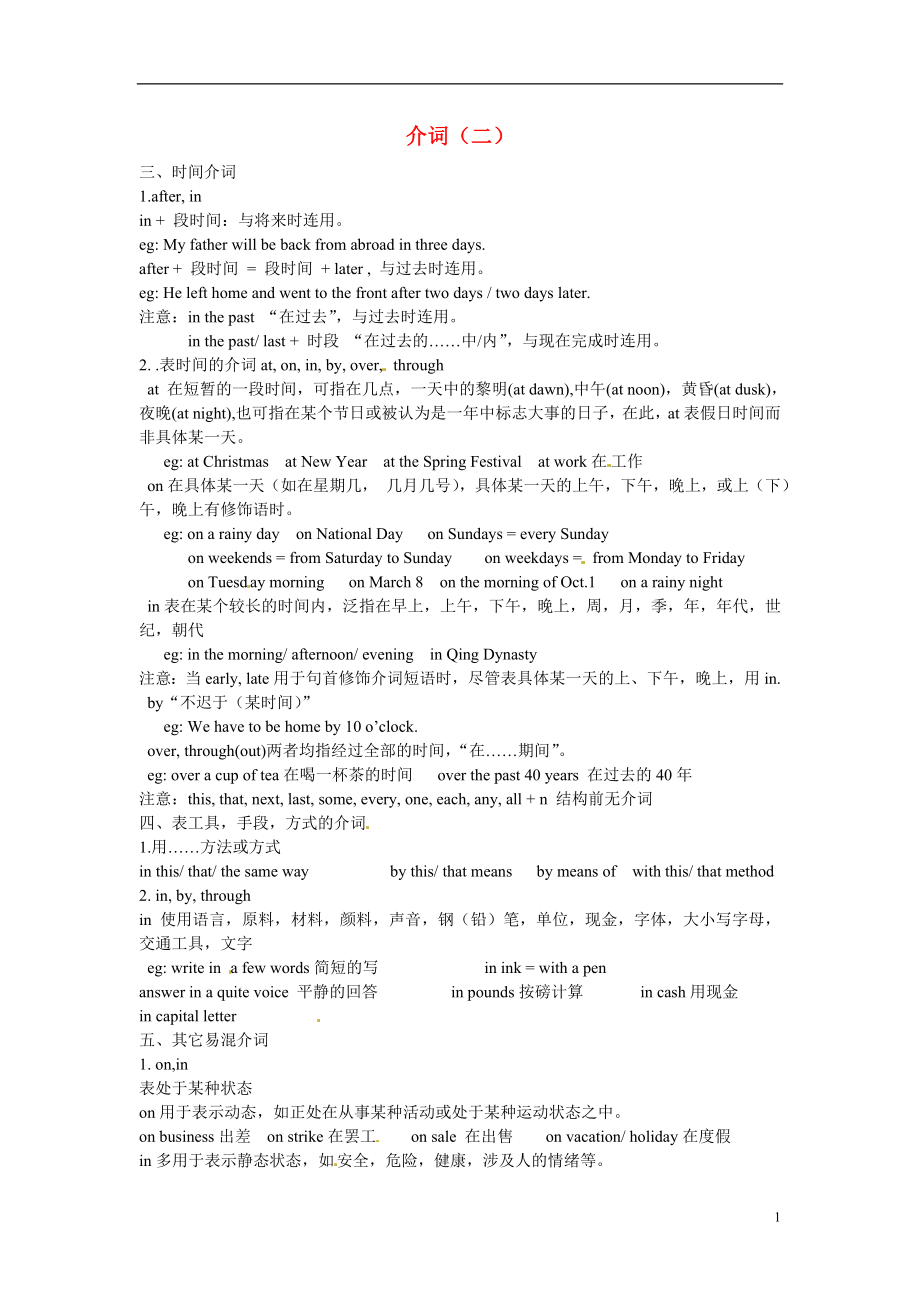《河北省撫寧縣第六中學(xué)2013-2014學(xué)年高二英語(yǔ) 介詞(2)學(xué)案》由會(huì)員分享,可在線閱讀����,更多相關(guān)《河北省撫寧縣第六中學(xué)2013-2014學(xué)年高二英語(yǔ) 介詞(2)學(xué)案(2頁(yè)珍藏版)》請(qǐng)?jiān)谘b配圖網(wǎng)上搜索。
1���、
介詞(二)
三��、時(shí)間介詞
1.after, in
in + 段時(shí)間:與將來(lái)時(shí)連用����。
eg: My father will be back from abroad in three days.
after + 段時(shí)間 = 段時(shí)間 + later , 與過(guò)去時(shí)連用���。
eg: He left home and went to the front after two days / two days later.
注意:in the past “在過(guò)去”�,與過(guò)去時(shí)連用��。
in the past/ last + 時(shí)段 “在過(guò)去的……中/內(nèi)”,與現(xiàn)在完成時(shí)連用����。
2.
2、.表時(shí)間的介詞at, on, in, by, over, through
at 在短暫的一段時(shí)間�����,可指在幾點(diǎn)����,一天中的黎明(at dawn),中午(at noon)�����,黃昏(at dusk)�,夜晚(at night),也可指在某個(gè)節(jié)日或被認(rèn)為是一年中標(biāo)志大事的日子,在此���,at表假日時(shí)間而非具體某一天�。
eg: at Christmas at New Year at the Spring Festival at work在工作
on在具體某一天(如在星期幾�����, 幾月幾號(hào)),具體某一天的上午�,下午,晚上����,或上(下)午,晚上有修飾語(yǔ)時(shí)��。
eg: on a rainy day
3����、 on National Day on Sundays = every Sunday
on weekends = from Saturday to Sunday on weekdays = from Monday to Friday
on Tuesday morning on March 8 on the morning of Oct.1 on a rainy night
in表在某個(gè)較長(zhǎng)的時(shí)間內(nèi),泛指在早上���,上午�����,下午���,晚上,周�,月,季�,年,年代,世紀(jì)��,朝代
eg: in the morning/ afternoon/ eveni
4�����、ng in Qing Dynasty
注意:當(dāng)early, late用于句首修飾介詞短語(yǔ)時(shí)��,盡管表具體某一天的上�、下午,晚上�����,用in.
by“不遲于(某時(shí)間)”
eg: We have to be home by 10 o’clock.
over, through(out)兩者均指經(jīng)過(guò)全部的時(shí)間����,“在……期間”���。
eg: over a cup of tea在喝一杯茶的時(shí)間 over the past 40 years 在過(guò)去的40年
注意:this, that, next, last, some, every, one, each, any, all + n
5���、結(jié)構(gòu)前無(wú)介詞
四、表工具�����,手段,方式的介詞
1.用……方法或方式
in this/ that/ the same way by this/ that means by means of with this/ that method
2. in, by, through
in 使用語(yǔ)言�,原料,材料��,顏料�����,聲音����,鋼(鉛)筆,單位�����,現(xiàn)金�,字體,大小寫字母�,交通工具,文字
eg: write in a few words簡(jiǎn)短的寫 in ink = with a pen
answer in a quite voice 平靜的回答
6����、 in pounds按磅計(jì)算 in cash用現(xiàn)金
in capital letter
五�、其它易混介詞
1. on,in
表處于某種狀態(tài)
on用于表示動(dòng)態(tài)����,如正處在從事某種活動(dòng)或處于某種運(yùn)動(dòng)狀態(tài)之中。
on business出差 on strike在罷工 on sale 在出售 on vacation/ holiday在度假
in多用于表示靜態(tài)狀態(tài)��,如安全��,危險(xiǎn)����,健康,涉及人的情緒等�。
in trouble陷入困境 in danger處于危險(xiǎn)中 in order
7、有序���,有條理
in surprise驚訝地 in silence 默默地 in high/ low spirits情緒高漲�����,低落
2.in與of表比較范圍
二者均可引出一個(gè)可供比較的范圍,適用于形容詞��,副詞的最高級(jí)�,指三者或三者以上的人或事物的比較����。
in表限定在某個(gè)范圍內(nèi)的最高級(jí)����。
of表同一類人或事物的最高級(jí)。
eg: Mary sings best in the school.
Of all the boys, Jack runs the fastest.
3.by表相差的程度
4.與介詞to連用的名詞:
key(鑰匙����,關(guān)鍵,
8�����、答案), answer, visit, apology, introduction(入門���,介紹), attitude, monument, devotion, reply, entrance, attention, invitation, home, way, notes
5.at常用于表溫度�,速度�,價(jià)格,比率���,水準(zhǔn)�,年齡��,時(shí)刻等名詞前,意為“以……��,在……”
6. to + one’s + 情感名詞 = to the + 情感名詞 + of sb.
eg: to my surprise 讓我吃驚
六����、易錯(cuò)用或多用的介詞
in the direction of… 朝……方向
9、 with the help of… 在……的幫助下
the news in the newspaper 報(bào)上的消息 the tickets for the film
leave for…出發(fā)去…… return to London = go back to London
enter the room serve the people
marry sb be married to sb
on one’s way back/ home/ to school/ here/ there
2
 河北省撫寧縣第六中學(xué)2013-2014學(xué)年高二英語(yǔ) 介詞(2)學(xué)案
河北省撫寧縣第六中學(xué)2013-2014學(xué)年高二英語(yǔ) 介詞(2)學(xué)案

